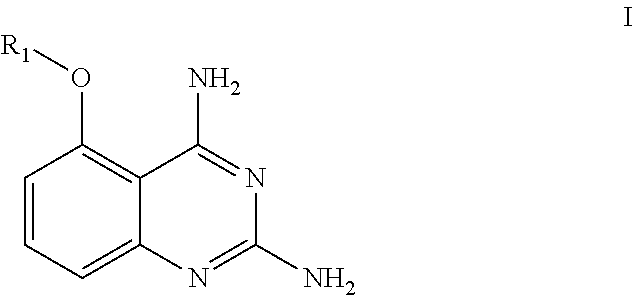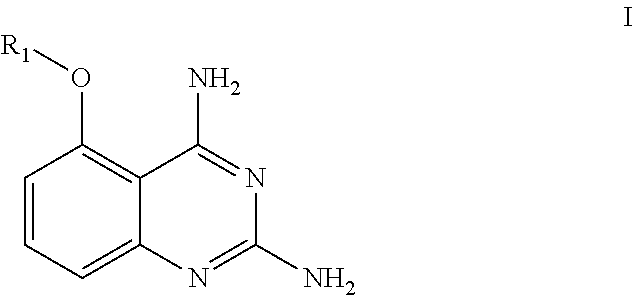Use of a quinazoline compound in preparing a medicament against flaviviridae virus
a technology of quinazoline and flaviviridae virus, which is applied in the field of medicament preparation, can solve the problems of no effective dengue fever vaccine, no effective vaccine, death in severe cases, etc., and achieve the effect of high inhibitive activity
- Summary
- Abstract
- Description
- Claims
- Application Information
AI Technical Summary
Benefits of technology
Problems solved by technology
Method used
Image
Examples
example 1
Preparation of Compound Yhhu-0967 (5-methoxy-2,4-diaminoquinazoline)
[0029]2.53 g (79.08 mmol) of methanol was dropped into 5.18 g (86.27 mmol) of 40% sodium hydride suspension in tetrahydrofuran (150 ml) at 0° C. and stirred for 10 min, followed by dropwise addition of 10.0 g (71.89 mmol) of 2,6-difluorobenzonitrile in tetrahydrofuran (100 ml). The reaction mixture as stirred at room temperature for 10 h to complete the reaction. 200 ml of water was added thereto to destroy the excess sodium hydride, and the reaction mixture was extracted with 500 ml of ethyl acetate. The organic layer was dried with anhydrous sodium sulfate and evaporated to dryness. The residue was passed through column chromatography to provide an intermediate. The intermediate and 17.41 g (143.78 mmol) of guanidine carbonate were heated to 140° C. in 300 ml of N,N-dimethylacetamide and stirred for 8 h to complete the reaction. The reaction mixture was evaporated to dryness, then diluted with 200 ml of water and ...
example 2
Preparation of Compound Yhhu-0968 (5-(4-chlorophenoxy)-2,4-diamino quinazoline)
[0031]10.0 g (71.89 mmol) of 2,6-difluorobenzonitrile, 10.17 g (79.08 mmol) of 4-chlorophenol and 19.87 g (143.78 mmol) of potassium carbonate were added into 300 ml of N,N-dimethylformamide, and stirred at 50° C. for 10 h to complete the reaction. The reaction mixture was evaporated to dryness, diluted with 200 ml water and extracted with 400 ml ethyl acetate. The organic layer was dried with anhydrous sodium sulfate and evaporated to dryness. The residue was passed through column chromatography to provide an intermediate. The intermediate and 17.41 g (143.78 mmol) of guanidine carbonate were heated to 140° C. in 300 ml of N,N-dimethylacetamide and reacted for 8 h to complete the reaction. The reaction mixture was evaporated to dryness, diluted with 200 ml of water and extracted with 400 ml of dichloromethane. The organic layer was dried with anhydrous sodium sulfate and evaporated to dryness. The residu...
example 3
Preparation of Compound Yhhu-0969 (5-(2-methoxyphenoxy)-2,4-diaminoquinazoline)
[0033]The title compound was prepared in the same manner as that in example 2, except that 2-methoxyphenol was used to replace 4-chlorophenol.
[0034]1H NMR (300 MHz, CHLOROFORM-d) ppm 5.26 (s, 3H) 7.54 (d, J=7.98 Hz, 1H) 7.67 (br. s., 2H) 8.36 (d, J=8.25 Hz, 1H) 8.54 (td, J=7.50, 1.79 Hz, 1H) 8.62-8.85 (m, 4H) 8.89 (br. s., 1H)
PUM
 Login to View More
Login to View More Abstract
Description
Claims
Application Information
 Login to View More
Login to View More - R&D
- Intellectual Property
- Life Sciences
- Materials
- Tech Scout
- Unparalleled Data Quality
- Higher Quality Content
- 60% Fewer Hallucinations
Browse by: Latest US Patents, China's latest patents, Technical Efficacy Thesaurus, Application Domain, Technology Topic, Popular Technical Reports.
© 2025 PatSnap. All rights reserved.Legal|Privacy policy|Modern Slavery Act Transparency Statement|Sitemap|About US| Contact US: help@patsnap.com



